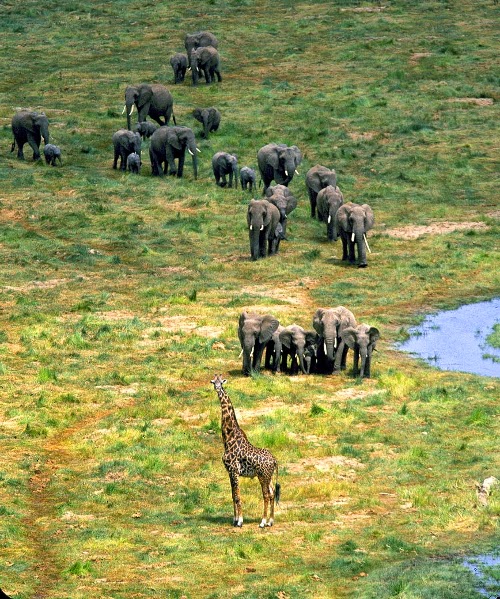Posted by: Dr. Deborah B. Jensen, President and CEO
Right now, you can help save wild elephants. In the few minutes it takes to read my message, your simple but remarkable action will alter the course of history for imperiled elephants and our world.
Please join me and sign the pledge never to buy, sell or trade ivory and to support a moratorium on ivory products in Washington state. Together, we will help stop the killing, stop the demand, and stop the trade. With one unified voice, our community can make a difference.
We already have a great running start. Just three hours after launching our 96 Elephants signature gathering effort, we soared right past our first 960 pledges. This community’s amazing groundswell of support and action is truly inspiring. Now, let’s multiply 960 over and over between now and August 12, World Elephant Day, when we’ll deliver all of the pledges to our elected officials to tell them Washingtonians are concerned about the plight of elephants and want action taken on the state level.
 |
| Dr. Deborah B. Jensen. Photo by Matt Hagen. |
Please join me and sign the pledge never to buy, sell or trade ivory and to support a moratorium on ivory products in Washington state. Together, we will help stop the killing, stop the demand, and stop the trade. With one unified voice, our community can make a difference.
We already have a great running start. Just three hours after launching our 96 Elephants signature gathering effort, we soared right past our first 960 pledges. This community’s amazing groundswell of support and action is truly inspiring. Now, let’s multiply 960 over and over between now and August 12, World Elephant Day, when we’ll deliver all of the pledges to our elected officials to tell them Washingtonians are concerned about the plight of elephants and want action taken on the state level.
Let's re-write the story for elephants
Recent research estimates 35,000 African elephants are being killed each year—about 96 elephants a day, due largely to rapidly rising demand for ivory and the brutal poaching carried out by organized crime groups. With only about 400,000 African elephants left in the wild, at this rate scientists believe that savanna elephants and their smaller forest cousins will be extinct within two decades.
If you are like me, you find these numbers extremely alarming and frankly, heart-breaking. It’s simple: Ivory trade equals extinction. We cannot allow poaching, the black market on ivory, or our own inaction to determine the course of history for elephants.
Let’s re-write this story. With the 96 Elephants campaign, you’ll join a fast-growing coalition of 150 accredited zoos, aquariums and other partners to change the future for African elephants. Nationwide, this coalition unites a broad base of civic leaders, organizations, constituencies and resources. Collectively, we will educate millions of people about the elephant crisis and take action to halt the elephant ivory trade. Most importantly, we’ll help prevent the senseless killing of these majestic animals.
Trinkets, terrorism and tusks
Your zoo has made an unwavering commitment to this campaign because we believe elephants must be saved in the wild. Most people I talk to believe that ivory sales are already outlawed. This is partially true, but because of complicated federal legislation and a lack of regulation in individual states, the black market for ivory is alive and thriving. Perhaps you would be shocked to learn that the U.S. has the second largest market for ivory. For what? Trinkets. Jewelry. Medicinal aides. Elephants need their ivory tusks more than we need these items.
 |
| U.S. Fish and Wildlife repository of confiscated wildlife items. Photo: Julie Larsen Maher/Wildlife Conservation Society. |
 |
| An infant African elephant stays close to its mother's side in Tarangire National Park, where elephants are under increasing threat from poaching for ivory and loss of critical habitat. Photo: Mustafa Hassanali/Tarangire Elephant Project, a Woodland Park Zoo Partner for Wildlife. |
Unfortunately, the story becomes even more tragic. As you’ve heard or seen in major media outlets, the brutal poaching of elephants for their ivory fuels organized criminal groups who kill park guards and other innocent people; traffic in the illegal drug and arms trade; and engage in terrorist activities that cause instability in nations around the world. One elephant tusk alone can bring in as much as $18,000 dollars to fund these activities. No wonder ivory is called “white gold.”
Last September at a meeting for the Clinton Global Initiative plan, African elephant range states requested help from the world. Since then, the U.S., China, France, Chad and Hong Kong have destroyed or will destroy several tons of confiscated ivory so it will never enter any market.
Clearly, we are all part of the problem. Instead, let’s unite and become the solution.
Join the herd
If you are moved by my short synopsis of the crisis, I promise that you can make a difference. Let’s multiply the amazing groundswell of support by August 12th, World Elephant Day.
Join Woodland Park Zoo in the 96 Elephants campaign and you will dramatically amplify your power as an agent of change. You can help others grasp the reality of this alarming, senseless slaughter of elephants. You can teach your community about the critical role African elephants play in sustaining the landscapes on which many animals – including humans – depend. And, you can encourage lawmakers to eliminate the significant loopholes in legislation by issuing a moratorium on ivory trade in the state of Washington.
I cannot imagine a world without elephants and my bet is you cannot either. Let’s re-write history for elephants together, now. After all, sometimes a herd mentality is a good thing.
 |
| Join the herd. Save elephants. Photo: Charles Foley/Tarangire Elephant Project, a Woodland Park Zoo Partner for Wildlife. |

Comments
Post a Comment